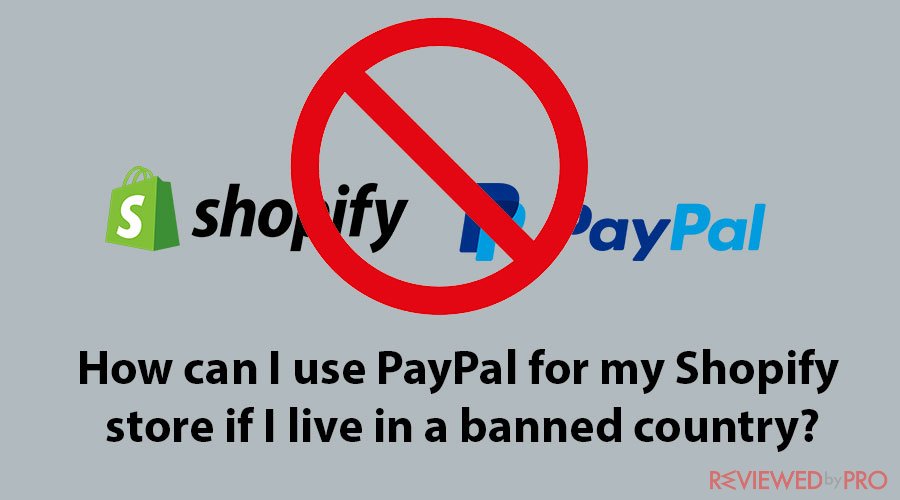
PayPal and Shopify are two powerful platforms that have revolutionized the world of e-commerce, enabling businesses to sell products and accept payments online. However, if you find yourself living in a country where PayPal is banned or restricted for use with Shopify, you may face challenges in integrating this popular payment solution into your online store. Despite the limitations imposed by your country's regulations, there are alternative approaches and workarounds that can potentially allow you to leverage PayPal's functionality within your Shopify store. In this article, we will explore potential solutions and considerations to help you navigate this situation and find viable ways to use PayPal with your Shopify store, even if you reside in a banned country.
Why Paypal cannot be used as a payment option on Shopify platform in some countries?
PayPal's inability to operate in certain countries can be attributed to various factors, including:
-
Regulatory Restrictions: Some countries have strict financial regulations and licensing requirements that make it challenging for PayPal to operate within their legal frameworks. These regulations may involve stringent requirements for money transfer services, compliance with anti-money laundering (AML) and know-your-customer (KYC) regulations, or restrictions on cross-border transactions. If PayPal is unable to meet these regulatory obligations or secure the necessary licenses, it may be prohibited from operating in those countries.
-
Economic Sanctions: PayPal, being a global payment processor, must comply with international sanctions imposed by governments or regulatory bodies. These sanctions can restrict financial services from operating in certain countries due to political or security concerns. PayPal may be compelled to suspend or restrict services in countries under such sanctions to avoid legal repercussions and ensure compliance with international regulations.
-
Risk Assessment and Fraud Prevention: PayPal employs stringent risk assessment and fraud prevention measures to protect its users and maintain the integrity of its platform. In some cases, PayPal may determine that the risk associated with operating in a particular country is too high due to a high prevalence of fraudulent activities or inadequate systems to combat fraud effectively. As a result, PayPal may choose to limit or suspend its services in those countries to mitigate risk.
-
Infrastructure and Operational Challenges: Operating in certain countries may pose logistical and operational challenges for PayPal. Factors such as limited banking infrastructure, unstable economic environments, unreliable telecommunications networks, or insufficient legal frameworks can make it difficult for PayPal to provide seamless and secure services. In such cases, PayPal may prioritize countries with more favorable conditions for its operations.
It's important to note that these factors are complex and can vary from country to country. PayPal's decisions regarding its operations in specific countries are influenced by a range of legal, regulatory, economic, and operational considerations.
The list of countries where PayPal is banned in 2023
|
|
|
What to do if you live in a country where PayPal is banned?
If you live in a country where PayPal is banned for use with Shopify, it can be challenging to integrate PayPal directly into your store. However, there are a few alternative approaches you can consider:
1. Third-Party Payment Gateways: Shopify supports various alternative payment gateways besides PayPal. Research and identify payment gateways that are available in your country and integrate with Shopify. Some popular options include Stripe, 2Checkout, Authorize.Net, PayU, or local payment processors specific to your region. These gateways can provide similar functionality to PayPal and allow you to accept payments from customers.
2. PayPal Proxy Services: There are proxy services available that can help you bypass the PayPal ban by acting as an intermediary. These services provide you with a virtual account in a country where PayPal is supported. Essentially, you receive payments from your customers into the proxy account, and the funds are then forwarded to your local bank account. This workaround can allow you to indirectly use PayPal in your Shopify store. However, keep in mind that using such services may have legal and compliance implications, so it's important to research and understand the potential risks.
3. Manual Payment Methods: If integrating a payment gateway is not feasible, you can consider offering manual payment methods to your customers, such as bank transfers, cash on delivery, or money orders. These methods require manual verification and processing of payments but can still enable you to receive payments from customers.
4. Consider Multichannel Selling: If the limitations persist for using PayPal with Shopify, you might explore selling your products through multiple channels. Set up alternative sales channels such as social media platforms, online marketplaces, or a separate self-hosted website that allows you to use PayPal directly. This way, you can leverage PayPal for payments outside of the Shopify ecosystem.
Review and comply with the terms and conditions of any alternative payment gateways or proxy services you choose to use. Additionally, consult with legal professionals or financial advisors who are familiar with the regulations in your country to ensure compliance with local laws and regulations when implementing alternative payment methods.
Concludions
Try thoroughly research and understand the legal and compliance implications of any alternative solutions you pursue. Consulting with legal professionals or financial advisors familiar with regulations in your country can help ensure you operate within the bounds of the law.
While navigating these challenges, it's important to stay informed about any changes in regulations or policies that may affect the availability of PayPal in your country. Regularly monitor updates from PayPal and explore opportunities to transition to other platforms or payment solutions that align with your business goals and local regulations.
Despite the obstacles, with careful consideration and strategic decision-making, you can find alternative ways to accept payments and continue operating your Shopify store effectively, even in a banned country.




